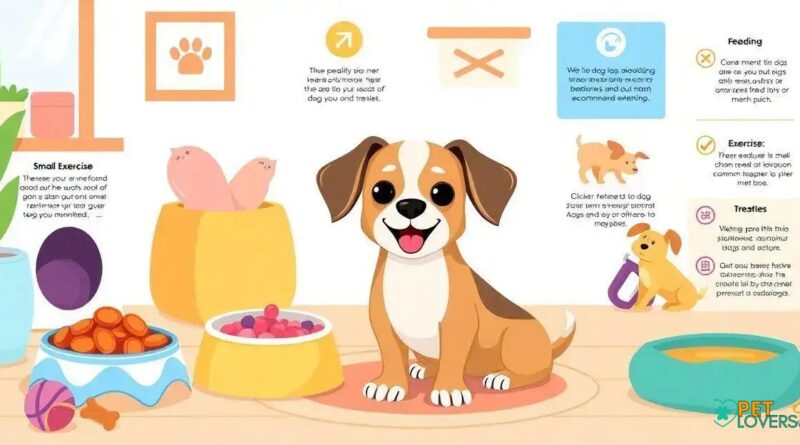Small Dog Care Tips You Need to Know for a Happy Healthy Pet
Caring for a small dog involves understanding their specific needs, including a balanced diet, regular exercise, and routine veterinary check-ups to prevent health issues like patellar luxation and dental problems. Positive reinforcement training and mental stimulation through activities like puzzle toys can enhance your bond and prevent behavioral issues, ensuring a happy and healthy life together.
Are you considering bringing a small dog into your family? With their adorable size and affectionate nature, it’s no wonder why many people fall in love with these tiny furry friends.
But before bringing home a small dog, it’s essential to understand their unique needs and requirements.
From their diet to exercise and training, small dogs have specific needs that must be met to ensure their happiness and health.
In this article, we’ll dive into the must-know small dog care tips to help you provide the best life for your new furry companion.
Small Dog Care Essentials
Small Dog Care Essentials: A Comprehensive Guide
Getting the right start with your small dog is crucial for a happy and healthy relationship. From preparing the right diet to setting up a comfortable living space, there are several essential elements to consider. Here are the top small dog care essentials to keep in mind:
- Proper Nutrition: Provide a balanced diet that meets your small dog’s unique needs, considering factors such as age, size, and breed.
- Comfortable Living Space: Ensure your small dog has a comfortable and quiet place to rest, with adequate space to move around.
- Regular Exercise: Provide regular exercise and playtime to keep your small dog physically and mentally stimulated.
- Regular Veterinary Check-Ups: Schedule regular check-ups with your veterinarian to monitor your small dog’s health and catch any potential issues early.
- Identification and Microchipping: Ensure your small dog is properly identified with a collar and tag, and consider microchipping for added safety.
Feeding Your Small Dog
Proper nutrition is essential for your small dog’s overall health and well-being. A balanced diet that meets your dog’s unique needs can help prevent various health issues and ensure they live a happy and healthy life. When it comes to feeding your small dog, there are several key factors to consider:
- Choose a high-quality dog food: Select a dog food that is formulated for small breeds and contains essential nutrients, vitamins, and minerals.
-
Feed the right amount
: Feed your small dog the recommended amount based on their size, age, and activity level to prevent overfeeding or underfeeding.
- Consider your dog’s sensitivities: If your small dog has food sensitivities or allergies, choose a dog food that is hypoallergenic and gentle on their stomach.
- Provide fresh water: Ensure your small dog always has access to fresh, clean water to stay hydrated.
- Monitor your dog’s weight: Keep an eye on your small dog’s weight and adjust their diet accordingly to prevent obesity and related health issues.
Exercise and Play for Small Dogs
Exercise and play are essential for your small dog’s overall health and well-being. Lack of physical activity can lead to behavioral problems, obesity, and other health issues. When it comes to exercising and playing with your small dog, there are several key factors to consider:
Provide regular exercise: Take your small dog on a daily walk, play fetch, or engage in other physical activities to keep them physically and mentally stimulated.
Choose the right exercise type: Select exercises that are suitable for your small dog’s age, size, and breed, and avoid high-impact activities that can put excessive strain on their joints.
Make it fun
: Exercise and play should be enjoyable for your small dog. Use positive reinforcement techniques and make it a fun experience.
Consider mental stimulation: In addition to physical exercise, provide mental stimulation through puzzle toys, scent work, and other activities to keep your small dog engaged and happy.
Monitor their energy levels: Pay attention to your small dog’s energy levels and adjust their exercise routine accordingly to prevent exhaustion.
Training Your Small Dog
Training your small dog is an essential part of their development and can help strengthen your bond with them.
Positive reinforcement training methods are recommended, as they promote trust and understanding between you and your dog.
Here are some key tips to keep in mind:
- Start with basic obedience commands: Teach your small dog basic commands such as sit, stay, and come, which will help you establish a strong foundation for further training.
-
Use positive reinforcement techniques
: Reward your small dog with treats, praise, and affection when they respond correctly to commands, rather than punishing them for mistakes.
- Be consistent and patient: Consistency and patience are key when training your small dog. Set a routine and stick to it, and remember that training takes time and effort.
- Use high-value rewards: Use high-value rewards such as treats and toys to motivate your small dog and encourage them to learn.
- Consider professional help: If you’re struggling to train your small dog or if they’re exhibiting behavioral issues, consider seeking the help of a professional dog trainer or behaviorist.
Common Small Dog Health Issues
Small dogs are prone to certain health issues due to their size and breed. It’s essential to be aware of these potential health issues and take steps to prevent them. Here are some common small dog health issues to watch out for:
- Patellar Luxation: A condition where the kneecap slips out of place, causing pain and discomfort.
-
Tracheal Collapse
: A condition where the trachea collapses, leading to coughing and difficulty breathing.
- Heartworms: Parasitic worms that infect the heart and lungs, causing serious illness and even death.
- Dental Issues: Small dogs are prone to dental problems, including tooth decay, gum disease, and tooth loss.
- Pancreatitis: Inflammation of the pancreas, which can cause abdominal pain, vomiting, and diarrhea.
Conclusion: Small Dog Care Essentials for a Happy and Healthy Pet
By following the small dog care essentials outlined in this article, you can help ensure your small dog lives a happy and healthy life.
From proper nutrition and exercise to training and monitoring health issues, every aspect of small dog care is crucial to their well-being.
Remember to stay vigilant and adapt your care routine as your small dog grows and evolves.
With patience, love, and attention, you can build a strong bond with your small dog and enjoy many happy years together.
FAQ – Frequently Asked Questions about Small Dog Care
What is the most important thing to consider when caring for a small dog?
The most important thing to consider when caring for a small dog is their unique needs and requirements. Small dogs require regular exercise, a balanced diet, and regular veterinary check-ups to stay healthy and happy.
How can I ensure my small dog gets enough nutrition?
You can ensure your small dog gets enough nutrition by feeding them a high-quality dog food that is specifically formulated for their size and breed. You should also consider adding supplements to their diet if recommended by your veterinarian.
What are some common health issues that affect small dogs?
Some common health issues that affect small dogs include patellar luxation, tracheal collapse, heartworms, dental issues, and pancreatitis. It’s essential to monitor your small dog’s health and seek veterinary care if you notice any signs of illness.
How can I train my small dog?
You can train your small dog using positive reinforcement techniques such as reward-based training and clicker training. Consistency and patience are key when training a small dog.
What are some tips for exercising my small dog?
Some tips for exercising your small dog include providing regular walks and playtime, avoiding high-impact activities that can put excessive strain on their joints, and incorporating mental stimulation activities such as puzzle toys and scent work.
How can I show love and affection to my small dog?
You can show love and affection to your small dog by spending quality time with them, providing plenty of praise and rewards, and giving them regular massages and cuddles.




